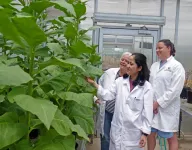(Press-News.org) New research has shown that results of blood tests routinely performed by GPs everywhere contain a hidden fingerprint that can identify people silently developing potentially fatal liver cirrhosis.
The researchers have developed an algorithm to detect this fingerprint that could be freely installed on any clinical computer, making this a low-cost way for GPs to carry out large scale screening using patient data they already hold.
Liver cirrhosis is the second leading disease causing premature death in working-age people (after heart disease). It develops silently and most patients will have no signs or symptoms until they experience a serious medical emergency and the first admission is fatal in one in three patients. Unlike most major diseases, the mortality rate for liver cirrhosis continues to increase and is now four times higher than forty years ago.
In this new study, published in the journal BMJ Open, a team of researchers developed the CIRRUS algorithm (CIRRhosis Using Standard tests) which they then used to analyse anonymised NHS data on blood test results taken in primary and secondary care for nearly 600,000 patients.
The algorithm was able to pick up over 70% of people with cirrhosis, months or years before they had their first emergency admission with liver disease. The accuracy rate of the test was around 90%.
The research was led by Professor Nick Sheron of the Foundation for Liver Research, who started the study whilst working at the University of Southampton. Prof Sheron said:
"More than 80% of liver cirrhosis deaths are linked to alcohol or obesity, and are potentially preventable. However, the process of developing liver cirrhosis is silent and often completely unsuspected by GPs. In 90% of these patients, the liver blood test that is performed is normal, and so liver disease is often excluded.
"This new CIRRUS algorithm can find a fingerprint for cirrhosis in the common blood tests done routinely by GPs. In most cases the data needed to find these patients already exists and we could give patients the information they need to change their lifestyle. Even at this late stage, if people address the cause by stopping drinking alcohol or reducing their weight, the liver can still recover."
Pamela Healy OBE, Chief Executive of the British Liver Trust said, "The UK is facing a liver disease crisis. Three quarters of people are diagnosed at a late stage when it is often too late for treatment of intervention yet liver disease does not get the same attention as the other major killers such as heart disease and diabetes. We are delighted to support this important study that could dramatically improve early detection rates. The challenge now is to ensure that early detection is embedded in NHS practice."
Co-author Michael Moore, Professor of Primary Health Care Research at the University of Southampton added, "Whilst we are all preoccupied with the coronavirus pandemic we must not lose sight of other potentially preventable causes of death and serious illness. This test using routine blood test data available, gives us the opportunity to pick up serious liver disease earlier which might prevent future emergency admission to hospital and serious ill health."
If implemented, the research team believe that the algorithm could be used in two ways. Firstly, incorporating it within existing GP systems could flag up warnings on an individual basis as tests are carried out. Secondly, a scan could be run across all patient data and those identified as being at risk would be invited back to the surgery for a confirmatory test.
Teresa Hydes from the University of Southampton who was also part of the research team added, "This test is free in many cases as a large proportion of UK adults will have already had a blood test at some point which would provide enough data to run the CIRRUS algorithm.
"The algorithm is freely available to GP practices or networks to install and therefore offers a low cost way to identify at risk individuals without using up limited NHS time and resources."
Professor Sheron concluded, "Liver cirrhosis is a silent killer, the tests used most by GPs are not picking up the right people, and too many people are dying preventable deaths. We looked at half a million anonymous records and the data we needed to run CIRRUS was already there in 96% of the people who went on to have a first liver admission. With just a small change in the way we handle this data it should be possible to intervene in time to prevent many of these unnecessary deaths."
INFORMATION:
Peer-reviewed / Observational study / People
For the study, published in the journal Diabetes, Obesity and Metabolism, researchers analysed data from the UK Biobank of 500,000 people aged 58 years on average, and found that people with higher than normal blood sugar levels were 42% more likely to experience cognitive decline over an average of four years, and were 54% more likely to develop vascular dementia over an average of eight years (although absolute rates of both cognitive decline and dementia were low).
The associations remained true after other influential factors had been taken into account - including age, deprivation, smoking, BMI and whether or not participants had cardiovascular disease.
People with ...
A team of scientists have measured the relative importance of the different obstacles that carbon dioxide (CO2) encounters in its voyage from the atmosphere to the interior of plant cells, where it is converted into sugars. This research leading method provides much needed information that will help to increase the yield of important food crops such as cowpea, soybean and cassava.
"Our data highlights promising targets to improve the diffusion of CO2 through the leaf with the aim of boosting crop productivity," says lead author Dr Tory Clarke, who works at The Australian National University (ANU), as part of the Realizing Increased Photosynthetic ...
Psychologists at the University of Bath, Cardiff, and London have developed the first ever 'mind-reading questionnaire' to assess how well people understand what others are really thinking.
A new approach to 'mind-reading' has been developed by researchers at the University of Bath, Cardiff, and London to improve how well we understand what others are thinking. And it transpires that women are much better than men at putting themselves in someone else's shoes.
Mind-reading, sometimes referred to in psychology as 'mentalising', is an important ability enabling us to pick-up on subtle behavioural cues that might indicate that someone we are speaking to is thinking ...
A new modelling study published in Anaesthesia (a journal of the Association of Anaesthetists) shows that the UK's coronavirus vaccination program is already reducing daily deaths. However, reductions of hospital and intensive care (ICU) admissions will likely take several weeks longer, with large reductions seen by the end of March and continuing into April.
The study is by Professor Tim Cook (Consultant in Anaesthesia and Intensive Care Medicine, Royal United Hospitals Bath NHS Foundation Trust, Bath, UK, and Honorary Professor, School of Medicine, University of Bristol, UK) and Mr ...
Anti-retroviral drugs are a vital tool in the prevention and treatment of HIV. A new study of pregnant women in Tanzania shows that life-long antiviral treatment also seems to prevent viral transmission from mother to baby. The results of the study, which was conducted in part by researchers at Karolinska Institutet in Sweden and published in Lancet HIV, make a promising contribution to the WHO's work with HIV prevention in low and middle-income countries.
Just over eight years ago, the World Health Organisation (WHO) issued recommendations known as Option B+ for a simpler and more effective prevention and treatment for HIV during and beyond pregnancy in low and middle-income countries.
One arm of the Option B+ programme involved ensuring that pregnant women with HIV ...
Researchers from North Carolina State University used a three-model approach to trace the between-farm spread of porcine epidemic diarrhea virus (PEDV), as well as to analyze the efficacy of different control strategies in these scenarios. The approach may enable farmers to be more proactive in preventing the spread of PEDV and to optimize their efforts to control the disease.
PEDV is a virus that causes high mortality rates in preweaned piglets. The virus emerged in the U.S. in 2013 and by 2014 had infected approximately 50 percent of breeding herds. PEDV is transmitted by contact with contaminated fecal matter.
"We wanted to compare three different models by using actual outbreak data in order to test their efficacy," says Gustavo Machado, assistant professor of population ...
To build a universal quantum computer from fragile quantum components, effective implementation of quantum error correction (QEC) is an essential requirement and a central challenge. QEC is used in quantum computing, which has the potential to solve scientific problems beyond the scope of supercomputers, to protect quantum information from errors due to various noise.
Published by the journal Nature, research co-authored by University of Massachusetts Amherst physicist Chen Wang, graduate students Jeffrey Gertler and Shruti Shirol, and postdoctoral researcher Juliang Li takes a step toward building a fault-tolerant ...
New research from the Indiana University Kelley School of Business shows first evidence that watching and learning from others can help reduce bias and improve decision-making.
The research, published END ...
MUSC Hollings Cancer Center researcher Yongxia Wu, Ph.D., identified a new target molecule in the fight against graft-versus-host disease (GVHD). Bone marrow transplant, a treatment for certain blood cancers, is accompanied by potentially life-threatening GVHD in nearly 50% of patients. A January 2021 paper published in Cellular and Molecular Immunology revealed that activating a molecule called STING may be a new approach to reduce GVHD.
Xue-Zhong Yu, M.D., professor in the Department of Microbiology and Immunology, focuses on understanding the intricate immune mechanisms that regulate GVHD development and anti-tumor activity.
Recently, STING (stimulator of interferon genes) has been highly studied in the context of cancer. Data from other groups has shown that STING activation ...
Irvine, CA - February 11, 2021 - Subconsciously, our bodies keep time for us through an ancient means - the circadian clock. A new University of California, Irvine-led article reviews how the clock controls various aspects of homeostasis, and how organs coordinate their function over the course of a day.
"What is fascinating is that nearly every cell that makes up our organs has its own clock, and thus timing is a crucial aspect of biology," said Kevin B. Koronowski, PhD, lead author and a postdoctoral fellow in Biological Chemistry at the UCI School of Medicine. "Understanding how daily timing is integrated with function ...





